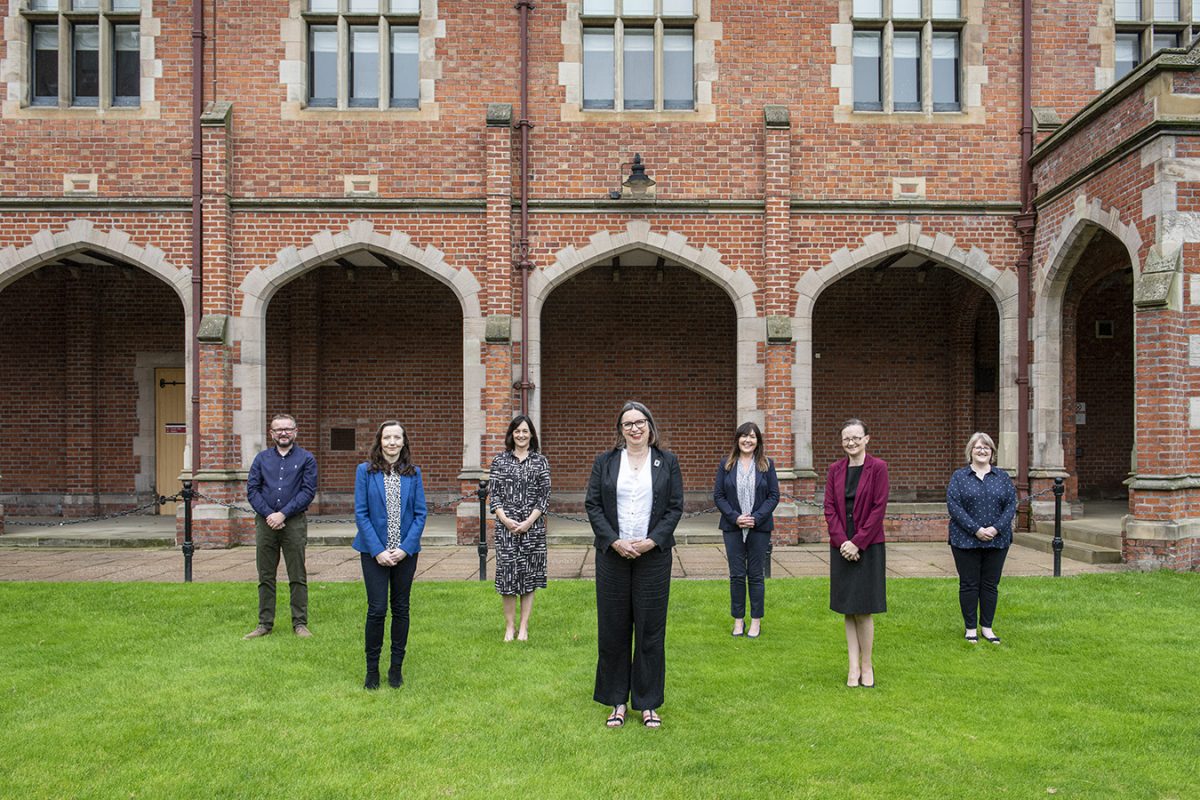Dermot Murray, Senior QA Engineer at Version 1 gives his top tips on embracing workplace systems and tech.

Why would you say enthusiasm to embrace tech is important in graduate roles?
It’s very important. Just in terms of the kind of innovation and bringing a fresh perspective to companies. So, like graduates are at the forefront of theoretical thinking. And what we’re looking to do is actually apply this knowledge into the real life and into the work industry. So, like if you take for example, a lot of kind of, you know, hardware and software, you know, the iPod Touch, for example, let’s say you know, it’s quite redundant nowadays because things change very quickly. And what we’re looking at is innovation and more efficient ways of working in industries, so, you know, one thing that companies can fall in the trap of is, you know, being reluctant to change. And actually graduates can be the catalyst for leading change. An example I can give would be, you know, the pandemic, for example, working from home. This is the kind of new normal that everyone’s really in, but you know, your university experience user being at the forefront of this, and how did you adapt and overcome these challenges? You know, the initiatives you use brought in terms of communication, engagement, socialising? These are all the things that need to be transferred into the industry. And these are things that we’re looking for. So it’s extremely important for enthusiasm and embracing change.
In what ways does your business rely on tech to maximise performance?
So it’s no surprise that for Version 1, it’s absolutely essential. So, we are consultancy, and we do specialise in supporting the digital transformation for clients. So we bring people through a journey using various technologies, what we try to do is use the cutting edge to deliver for our clients. But internally, so that’s the probably technical side. But you know, what we actually do ourselves is we use it to communicate and standardise. I’ll give a few examples of, you know, some of the kind of tech initiatives that we do, we have a podcast, you know, once a year one in which we have conversations within the industry. On our website, we’ve got webinars, blogs, white papers, news articles, and these are things you know, to engage with the industry and engage with many different people, social media platforms, that Instagram that I’m on right now, we’ve also got Facebook, LinkedIn, etc. You name it for contact. And internally, as much as maybe you know, us, us and university, we’re using teams to communicate with clients. And finally, then, you know, we’ve got like a SharePoint with a widevariety of tools, for using timesheets, you name it, so absolutely essential, yes indeed.
How would you go about proving ability to use common programmes and apps in an interview?
That’s a good question. It’s hard to kind of slide that into the question, how you’re phrasing that. I think the star approach is quite interesting. So, you know, kind of being concise and what that really is – situation, task, action and result. And maybe within the action, you could incorporate these kind of common tools and what you’ve done. So maybe an example that I could give would be that, say, one of your modules, and you’re required to do presentation, will, the action in which you can provide could be, you know, using PowerPoint efficiently and effectively, to relay the information to your peers, to you know, everyone, like the ultimate result being you know, like you achieve top marks. And also, there’s definitely ways of fitting into the question tools in which you know, you can, you know, provide results for if that makes sense.
What examples can you use of innovating to maximise technology?
One example could be for a solution, there could be an alternative tool or technology that could be used, or maybe you could extend in a technology. So for example, that’s you know, we’re on a Teams meeting, Microsoft Teams, and we’re trying to kind of collaborate together, you know, some project, there’s a tool – Slack, which can actually be used for sketching. And that’s quite useful for like, you know, drawn with feedback, kind of in sketching, going through walk walkthroughs so you know, instead of using teams, maybe you could migrate your kind of communication to Slack. The point on expanding then is, you know, using it in additional scope as well, slack also has like a kind of app directory as well. So you can add in polls, you know, chatbots news feeds. And there’s different ways of just, you know, not kind of following what is set in front of you, but actually using your initiative and, you know, embracing the tech really, and, you know, leading on further so I suppose.
How would you advise a student to show their passion for tech when they don’t have a tech background?
So, I suppose from my perspective, I have to put myself out of the mindset of being in tech. But that’s, I think, a good way of kind of, you know, showing your enthusiasm can really be through hobbies and interest, really. So that’s dependent on the person, but I’ll give you an example, maybe of a few kind of hobbies and interests that I have, you know, if I’m reading a book, for example, you know, I’m interested in reading, specifically, one of the books I’m reading right now is on the stock markets, flash boys are called, and it’s on high frequency trading, and the kind of idea of being closer to the stock market servers. Think sports, you know, we’ll play a bit of football. And I’m kind of using, you know, stat sports. So it’s kind of integrate and, you know, heart monitor, kind of initiatives and all that stuff. And then Sports Science again that podcast I’m interested in, there’s one, dark net diaries, but just kind of cybersecurity focus. So even though I’ve kind of got my technical job, if you picked up the side, there’s a whole wide range of kind of, you know, industry within tech and these tech tools in which you can like, kind of, take your hobby, and maybe think of, you know, some kind of innovation in tech tools that you can use to, you know, showcase that. So, just a few points of my interest might not be to impress everyone here.
How can you show that you have the ability to adopt and use technology in an interesting way?
Yeah, so I think you could maybe think about how you can use it an interesting way, think about, like, what you’re currently using stuff for the think of like, you know, your smartphone, for example. It’s got so many applications in which you can download, as I mentioned, with your hobbies, you know, Strava, being able to, like, you know, detect your matrix of roaming, for example, everything, these are kind of, you know, common applications that you don’t really think that you’re using, but you’re actually using, think of maybe, you know, smart appliances, for example, around the house, you might have kind of smart TV, or smart lamp, and how you can actually then, you know, showcase that and help people. So I’ve got family that always asked me ‘Dermot, how do you do this, do that.’ And I’m always kind of demonstrating to them, but also by kind of, you know, using this tech, you understand it more, and you can actually demonstrate it to other people. And that really helps with your show of skills with kind of, you know, leadership, it helps for what the industry is really looking, you know, you’re looking a community of practice people who share, collaborate and transfer knowledge together. And just by getting cool, and getting stuck in really kind of corny, it’s not.
How can you embrace technology and help others to do so?
I’ve really touched on that and for example, of maybe helping, you know, that’s, you know, like, update the latest software on his phone or laptops, for example, some security plan says, and my mom dad’s face, you know, helping them kind of just stuff yet. And that’s kind of you know, one of the things really just by getting involved and getting stuck in even necessarily you don’t quite understand that at the time but by getting involved in that tool, and helping other people you know, you’re helping yourself as well. And I think it’s just kind of a stage of getting involved really is the best way to do that.
How important what would you say, is practical experience of workplace technology.
So, I do think it’s kind of very important, you know, you’ve got the theory behind it, and you want to kind of, you know, put it practical. So that’s the kind of stuff you know, with uni, you’d want to take into the industry and kind of get stuck in. And that really is the word kind of get stuck in. I never imagined myself kind of growing up to be a software tester. But getting involved in the IT industry, you see kind of what opportunities arise. And not even just within the kind of tech sector, think about the other different industries, in which you don’t necessarily know what you’re getting involved in, but by you know, utilising tech tools and, you know, embracing innovation, think of that as the bigger picture rather than, you know, specifically just tech related, but innovation. Going back to kind of, you know, tech, there’s a lot of open source tools that you can use, and they will be free to use in terms of, you know, try and find the right things, there’s a lot of free trials of stuff. So for example, maybe like Photoshop or video editing skills, if you need some experience, but then in industry, or within a kind of, you know, hobby that say, I don’t know what but you can maybe use that for like 30 days or seven days, and that might be sufficient to kind of pick up your skills. Finally, as well, like, there’s, if you’re going technical, there’s, you know, Azure has free courses for students, and it also has a free account where you can get, you know, up to 200 pounds, etc, you know, that kind of sandbox and play with kind of technical tools. And, yeah, I think as well, one important thing is even like the practicalness of social media is so important, and a lot of kind of students and people forget, you know, how important it is for companies. So even just, you know, you’re you’re getting full freight and with kind of social media, and that practical way of applying your skills.
How can you demonstrate that you have developed key workplace skills, and technology?
Yeah, so the demonstration then is kind of, by providing and showing examples of how you’ve kind of came up with that, I think, like, by demonstrating as well, you need to kind of understand, firstly, that it depends on the role. Or at least, like, there’s a lot of opportunities in which you can actually, you know, enhance your skills, I would give examples of, you know, on LinkedIn, if anyone’s involved aon LindkedIn, there’s a lot of webinars in which you can kind of do get involved within tools and tech and understand kind of components. As well as that specifically within your industry. I think like one or two personal references, which I used to be Udemy. And it’s good for kind of, you know, harnessing and developing skills, and then being able to present them and relay them back into work back into my CV and back into kind of, you know, day to day skills as well. So there’s a lot of opportunities out there. And there’s a lot of kind of free things that you can view online and just taking upon each of the applications as well, such as meetups really, like might be a bit hard during the pandemic, but embracing the change, maybe you know, Slack or, you know, Teams might be a good solution for that. So webinars. Yeah.
What soft skills would you say go hand in hand with tech skills?
There’s, there’s a lot really like, one thing to think is, is well, that, you know, technology skills are just tools of making your soft skills more efficient than effective. So like numeracy skills, for example. I mean, that that’s really given within the IT industry, you know, you could talk about coding performance or all aspects, but not just specifically with the IT industry, like you can think about, you know, your communication skills with putting this many times but social media, using teams, you know, creativity skills as well. creativity to complex solutions, like my job is doing quality assurance, and it kind of plays into analytical thinking and problem solving. And by problem solving, you have to be very creative on you know, there’s a lot of constraints to the problem and how you fix that. So there’s there’s definitely ways to express willingness to learn as well. So embracing the technology which is the key point of everything, being able to, you know, go into new skills and new tools and test new systems up correctly. And even gone non technical within the IT industry, you know, there’s a lot of project masters and kind of, you know, Scrum masters etc project manager sorry that, you know, we really focus on organisation and there’s a lot of kind of tools that are available to you know help kind of do that, calendars, JIRA for, you know, management. So, they’re inextricably linked, really in my opinion.
What would you say you should include in the IT skills section on your CV?
Yeah, that’s a good question. I suppose it’s dependent on the possession and the industry, I mean, you should really do your research on kind of, you know, what type of roles you’re applying for, and kind of think about that, I think, but whenever you were talking about the common applications in the office 365 suite, you know, there’s always, you know, opportunity ability to kind of show that, and that’s, you know, applicable across any industry. Think about the bespoke software on which you can use, might go back to, you know, if you’re doing some design with somebody with a website in Photoshop could be useful, you know, five years from now, that could be a tool your skill to be included. But going back, then definitely have a look at the industry standards in which you’re applying for. So if I go back to my kind of key position, I’d be looking for kind of buzzwords with selenium, kotlin, cucumber, postman, Java, just you know, as an interfere. And if I just see that within an application, that would pique my interest, and you know, like, that would be the same thing that you need to think then is going to position like, take up the industry standard tools, and learn a wee bit about that. So whenever you go into, you know, an opportunity or an interview, you’re able to kind of, you know, demonstrate ‘Yes, I know what that is certainly’. Also, it’s always nice to kind of add in any certifications that you’ve got within your university – Udemy courses, as well as other mentions. And definitely, as well, like, you can also maybe use going back to the kind of soft skills that you’re mentioning, you can maybe then use IT skills to support your soft skills. So I’m good at communication. Here’s a reason. So evidence based as well so it’s ready and can be used really.
Interested in Version 1? Version 1 are currently recruiting. You can find details of their current vacancies on the Gradfest2021 site.

Version 1 are proud sponsors of GradFest2021










